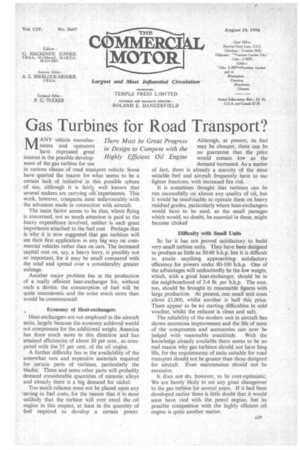Gas Turbines for Road Transport?
Page 31

If you've noticed an error in this article please click here to report it so we can fix it.
There Must be Great Progress in Design to Compete with the Highly Efficient Oil Engine
MANY vehicle manufacturers and operators have expressed great interest in the possible development of the gas turbine for use in various classes of road transport vehicle. Some have queried the reason for what seems to be a certain lack of initiative in this possible sphere of use, although it is fairlz well known that several makers are carrying out 'experiments. This work, however, compares most unfavourably with the advances made in connection with aircraft.
The main factor seems to be that, where flying is concerned, not so much attention is paid to the heavy expenditure involved, neither is such great importance attached to the fuel cost Perhaps that is Why it is now suggested that gas turbines will see their first application in any big way on commercial vehicles rather than on cars. The increased capital cost on, say, a heavy lorry, is possibly not so important, for it may be small compared with the total and spread over a considerably greater mileage.
Another major problem lies in the production of a really efficient heat-exchanger for, without such a device, the consumption of fuel will be quite uneconomic and the noise much more than would be countenanced.
Economy of Heat-exchangers Heat-exchangers are not employed in the aircraft units, largely because the economy achieved would not compensate for the additional weight. America has done much more in this direction and has attained efficiencies of about 30 per cent., as compared with the 35 per cent. of the oil engine.
A further difficulty lies in the availability of the somewhat rare and expensive materials required for certain parts of turbines, particularly the blades. These and some other parts will probably demand considerable quantities of nimonic alloys and already there is a big demand for nickel.
Too much reliance must not be placed upon any saving in fuel costs, for the reason that it is most unlikely that the turbine will ever excel the oil engine in this respect, at least in the quantity of fuel required to develop a certain power. Although, at present, its fuel may be cheaper, there can be no guarantee that the price would remain low as the demand increased. As a matter of fact, there is already a scarcity of the most suitable fuel and aircraft frequently have to use lighter fractions, with increased fire risk.
It is sometimes thought that turbines can be run successfully on almost any quality of oil, but it would be unadvisable to operate them on heavy residual grades, particularly where heat-exchangers would have to' be used, as the small passages which would, no doubt, be essential in these, might become choked Difficulty with Small Units So far it has not proved satisfactory to build very small turbine units. They have been designed to produce as little as 50-60 b.h.p. but it is difficult to attain anything approaching. satisfactory efficiency for powers under 80-100 b.h.p. One of the advantages will undoubtedly be the low weight, which, with a good heat-exchanger, should be in the neighbourhood of 3-4 lb. per b.h.p. The cost, too, should be brought to reasonable figures with large production. At present, one small unit costs about £1,000, whilst another is half this price. There appear to be no starting difficulties in cold weather, whilst the exhaust is clean and safe.
The reliability of the modern unit in aircraft has shown enormous improvement and the life of most of the components and accessories can now be judged with reasonable exactitude. With the knowledge already available there seems to be no real reason why gas turbines should not have long life, for the requirements of units suitable for road transport should not be greater than those designed for aircraft. Even maintenance should not be excessive.
It does not do, however, to be over-optimistic. We are barely likely to see any great changeover to the gas turbine for several years. If it had been developed earlier there is little doubt that it would soon have vied with the petrol engine, but its possible competition with the highly efficient oil engine is quite another matter.




































































































